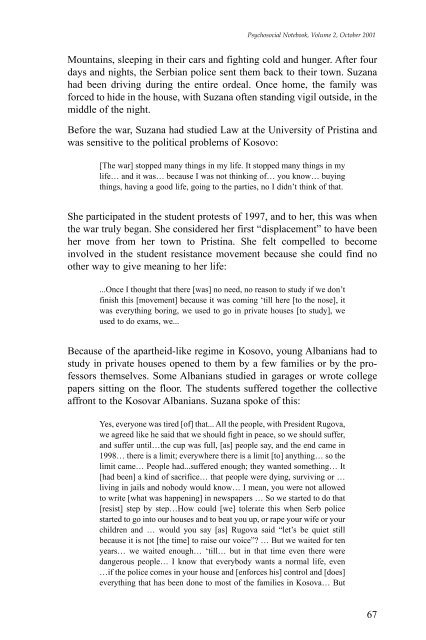Psychosocial Notebook - IOM Publications - International ...
Psychosocial Notebook - IOM Publications - International ...
Psychosocial Notebook - IOM Publications - International ...
You also want an ePaper? Increase the reach of your titles
YUMPU automatically turns print PDFs into web optimized ePapers that Google loves.
<strong>Psychosocial</strong> <strong>Notebook</strong>, Volume 2, October 2001<br />
Mountains, sleeping in their cars and fighting cold and hunger. After four<br />
days and nights, the Serbian police sent them back to their town. Suzana<br />
had been driving during the entire ordeal. Once home, the family was<br />
forced to hide in the house, with Suzana often standing vigil outside, in the<br />
middle of the night.<br />
Before the war, Suzana had studied Law at the University of Pristina and<br />
was sensitive to the political problems of Kosovo:<br />
[The war] stopped many things in my life. It stopped many things in my<br />
life… and it was… because I was not thinking of… you know… buying<br />
things, having a good life, going to the parties, no I didn’t think of that.<br />
She participated in the student protests of 1997, and to her, this was when<br />
the war truly began. She considered her first “displacement” to have been<br />
her move from her town to Pristina. She felt compelled to become<br />
involved in the student resistance movement because she could find no<br />
other way to give meaning to her life:<br />
...Once I thought that there [was] no need, no reason to study if we don’t<br />
finish this [movement] because it was coming ‘till here [to the nose], it<br />
was everything boring, we used to go in private houses [to study], we<br />
used to do exams, we...<br />
Because of the apartheid-like regime in Kosovo, young Albanians had to<br />
study in private houses opened to them by a few families or by the professors<br />
themselves. Some Albanians studied in garages or wrote college<br />
papers sitting on the floor. The students suffered together the collective<br />
affront to the Kosovar Albanians. Suzana spoke of this:<br />
Yes, everyone was tired [of] that... All the people, with President Rugova,<br />
we agreed like he said that we should fight in peace, so we should suffer,<br />
and suffer until…the cup was full, [as] people say, and the end came in<br />
1998… there is a limit; everywhere there is a limit [to] anything… so the<br />
limit came… People had...suffered enough; they wanted something… It<br />
[had been] a kind of sacrifice… that people were dying, surviving or …<br />
living in jails and nobody would know… I mean, you were not allowed<br />
to write [what was happening] in newspapers … So we started to do that<br />
[resist] step by step…How could [we] tolerate this when Serb police<br />
started to go into our houses and to beat you up, or rape your wife or your<br />
children and … would you say [as] Rugova said “let’s be quiet still<br />
because it is not [the time] to raise our voice”? … But we waited for ten<br />
years… we waited enough… ‘till… but in that time even there were<br />
dangerous people… I know that everybody wants a normal life, even<br />
…if the police comes in your house and [enforces his] control and [does]<br />
everything that has been done to most of the families in Kosova… But<br />
67

















